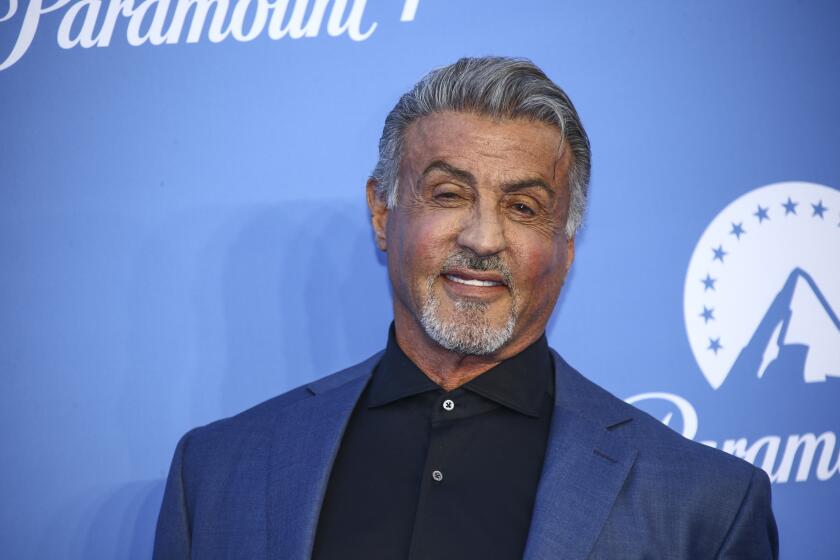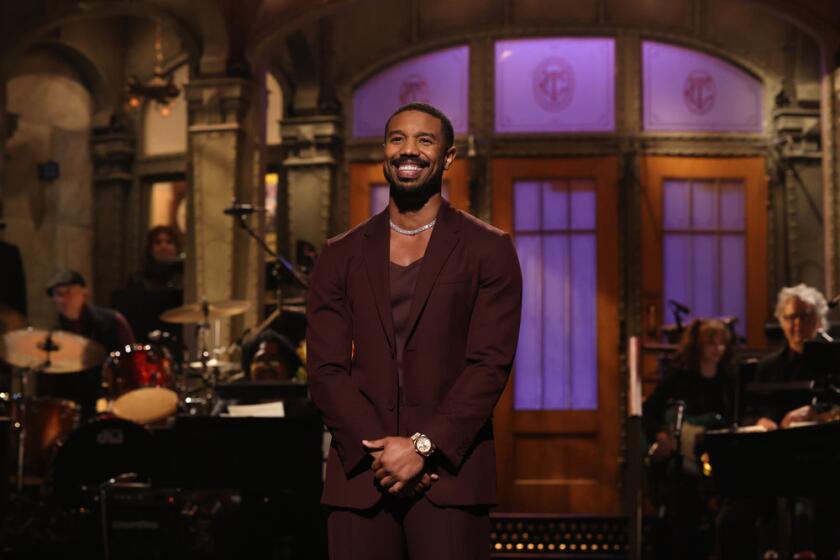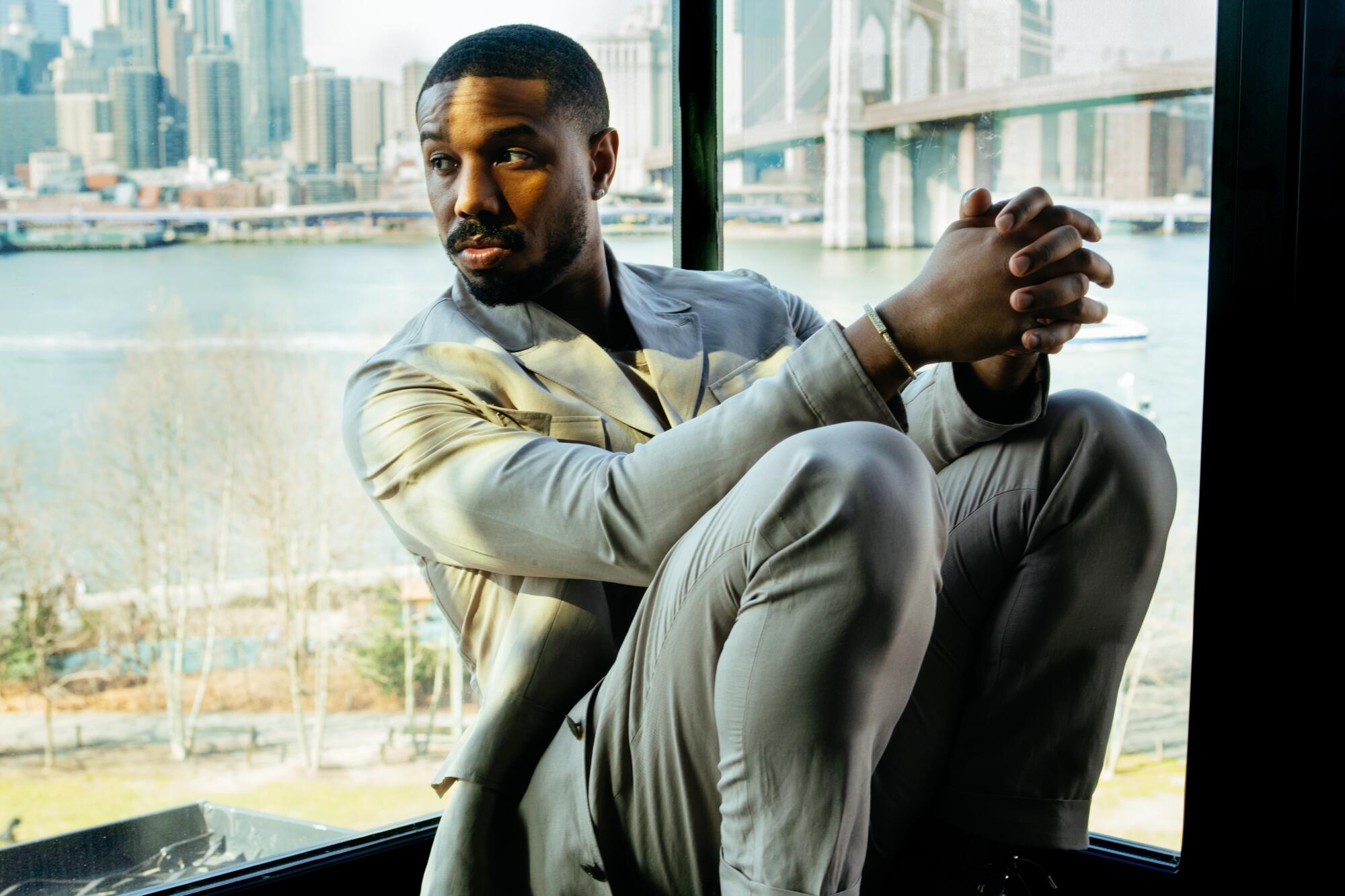
- Share via
The violent grudge match is over. Adonis Creed, son of former heavyweight champion Apollo Creed, has defeated Viktor Drago, the son of the Russian boxer Ivan Drago — who killed Apollo in the ring almost 40 years ago. Rocky Balboa, who trained Creed for the bout, regards his fighter with pride and admiration, reaching for a fist-glove bump. As the retired “Italian Stallion” assures the offspring of his former rival in this climactic moment from “Creed II,” the eighth installment in the venerable “Rocky” franchise, “It’s your time.”
Michael B. Jordan understands the sentiment.
Since breaking through in the fact-based “Fruitvale Station” a decade ago, playing a young Bay Area man who has a deadly encounter with transit police, his meteoric rise has paved the way for a gallery of acclaimed performances in projects such as “Black Panther,” “Without Remorse,” “Just Mercy” and the “Creed” films.
With “Creed III,” the latest chapter in the saga, the phrase takes on a whole new meaning: The film represents the most important — and riskiest — venture of Jordan’s career, seizing ownership of Stallone’s creation, the most successful sports franchise in film history, and injecting it with themes of personal and cultural significance absent from other “Rocky” films.
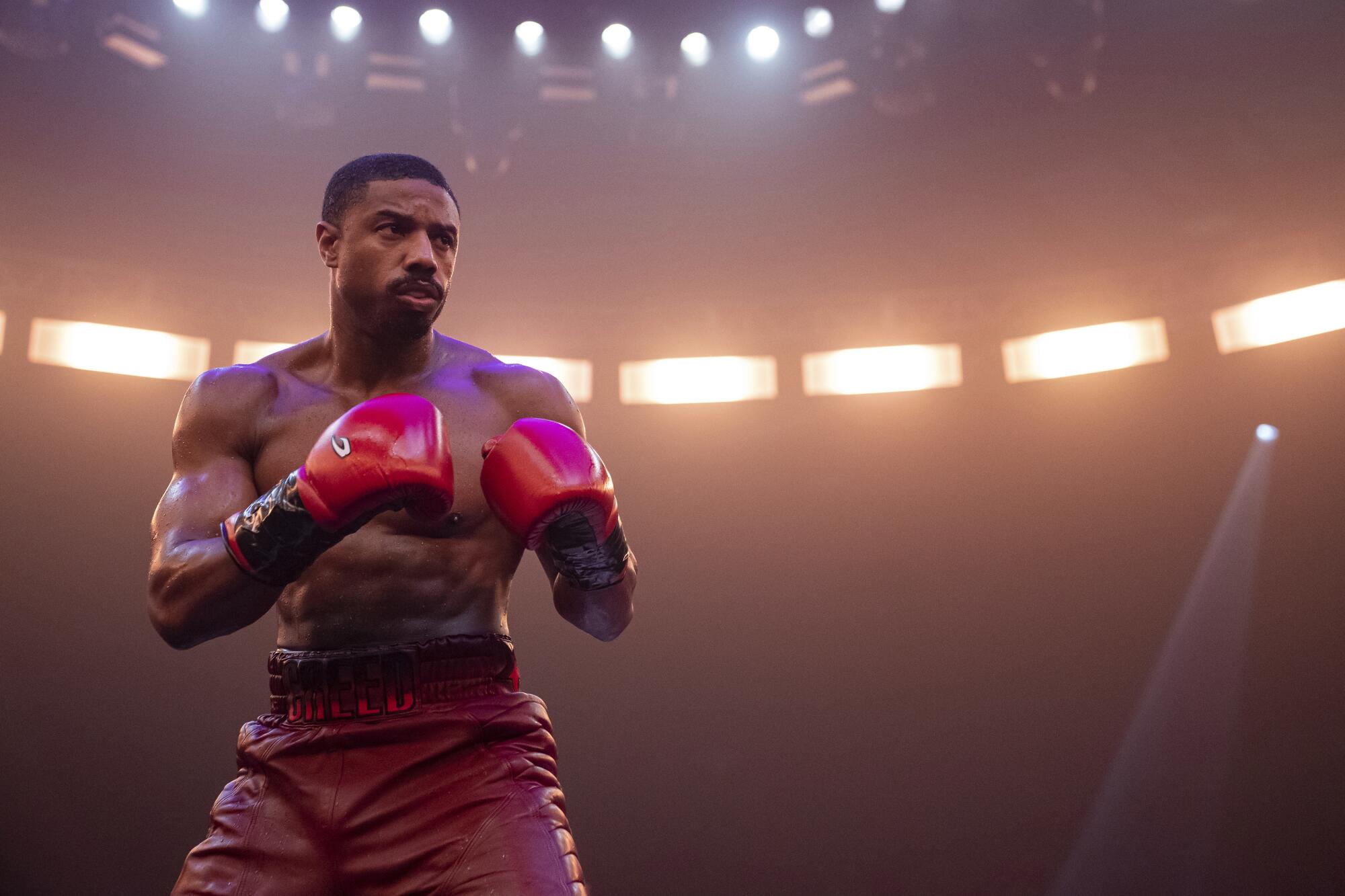
In addition to reprising his muscular character, Jordan is also making his directorial debut. The setting has moved from Philadelphia to Los Angeles, and the presentation is epic: The brutal fight sequences were filmed with Imax cameras to fulfill Jordan’s mission of putting the viewer “right in the middle of the battle.” Creed’s nemesis this time around is played by the red-hot Jonathan Majors, who is being swept up in his own “it’s your time” buzz.
Not that the heightened expectations have Jordan ruffled. Sitting in a Beverly Hills hotel suite a few days before the film’s star-studded Hollywood premiere, he is chill personified, exhibiting the air of an artist secure in his ambitions and leadership. He recognizes he’s got some big gloves to fill, taking charge without the regular presence of Stallone or his frequent collaborator Ryan Coogler, the director of “Fruitvale Station,” “Black Panther” and “Creed.”
But he made it clear he had no choice. He was driven to follow his artistic instincts in taking the “Rocky” franchise in a new and more topical direction, aware that the challenges would be formidable.
‘It was taken in a direction that is quite different than I would’ve taken it,’ Sylvester Stallone said of ‘Creed III,’ the latest ‘Rocky’ film.
“There’s nothing anyone could have told me to prepare me for what I was getting ready to do,” Jordan said, leaning forward on a sofa. “People have tried and I have listened, and there still is no comparison to what my wildest challenges were. But I gotta take my swings.”
Jordan’s commanding involvement in “Creed III” is evidence of just how far he has outdistanced the label of heartthrob, having once scored People magazine’s crown of “Sexiest Man Alive.” In addition to acting, he has been a producer of most of his projects, including “Creed III,” and his Outlier Society production company has prioritized discovering and amplifying diverse creators.
He knows his move to directing will be scrutinized: “As a person who’s always been compared to someone else, who has been opinionated on and picked apart as far as being in front of the camera my entire career — well, I’m used to that. But it’s never been on this scale, this level. And never before have I had this personal connection to what I’m doing.
“But there’s a lot of pride and excitement with this opportunity to be seen like I’ve never been seen before. That’s pretty cool.”
“Creed III” picks up several years after the conclusion of “Creed II,” with Creed in retirement and enjoying life with his musician wife, Bianca (Tessa Thompson), and their young daughter, Amara (Mila Davis-Kent). Their calm is upended when Creed’s childhood buddy and aspiring boxer Damian “Dame” Anderson (Majors) reappears after an 18-year prison stint for a violent incident that involved Creed.
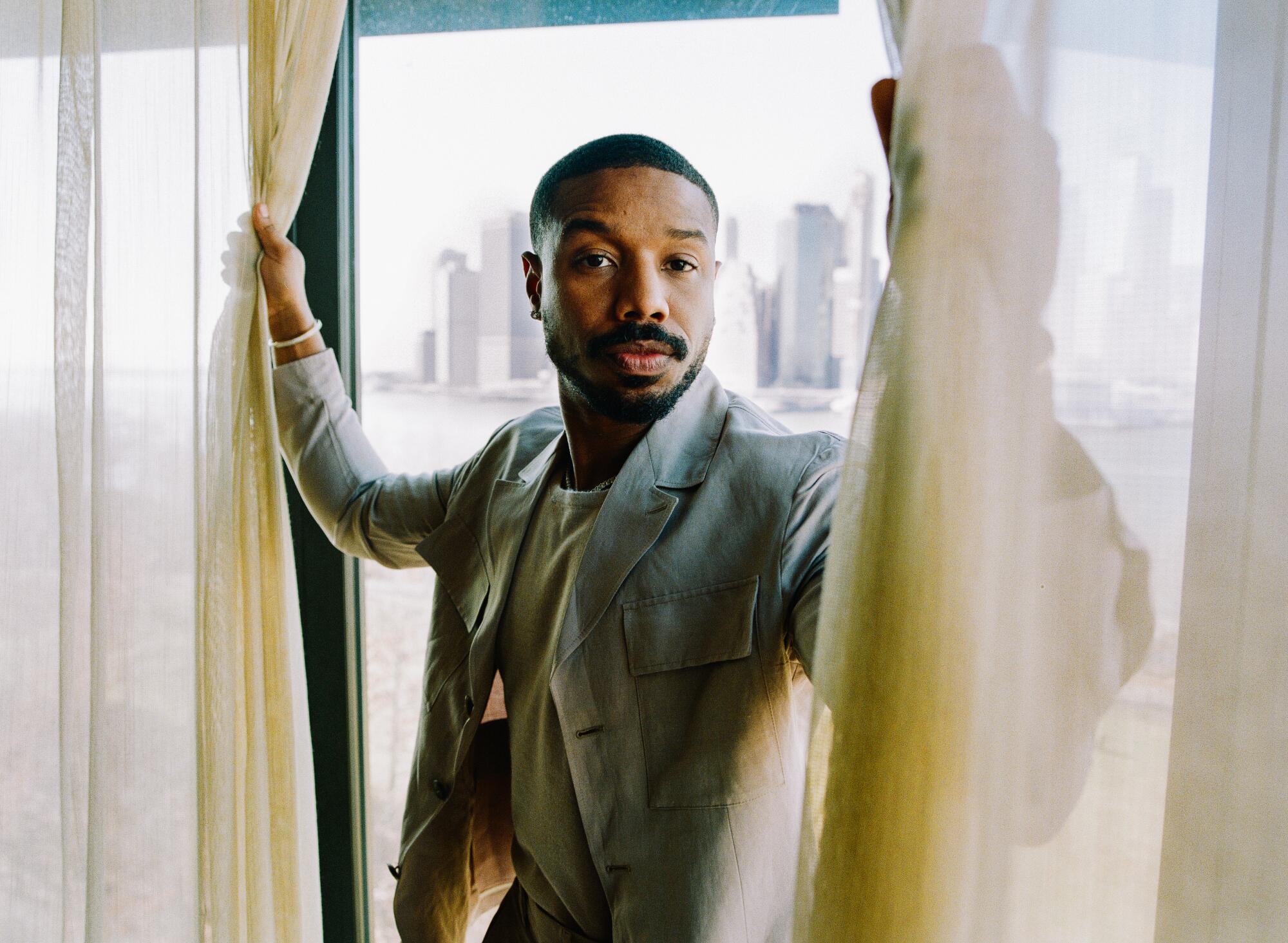
Dame’s menacing agenda puts the former friends on a collision course that forces Creed out of retirement and back into the ring for a brutal showdown.
Key to Jordan’s vision was reflecting the parallels between Creed‘s life and his own: “My personal life and this character have been interlinked for the last nine years. It’s super weird to play a character going through the same things I’m going through. Yes, the franchise has been one way. But this isn’t ‘Rocky.’ This is ‘Creed.’ Their experiences are going to be totally different. They look different. I live in reality.”
Though he respected the “Rocky” formula, Jordan wanted to mesh the noisier action with more intimate examinations of Black masculinity and its toxic potential, childhood trauma and the challenges — and power — of forgiveness.
“The only way to tell that story was, first of all, make it feel like an origin story, a sequel and part of the trilogy all in one,” said Jordan. “I need to honor the invisible contract I’ve made with my audience, which is what they expect from these Rocky-Creed films, but also bring my twist and spin on it. We are showing what is truthful to Adonis as a Black man living in America.”
And he’s not finished. He is already thinking about creating a “Creed-verse”: “You will see more of Creed in various different forms. The intellectual property is so rich. And I’m of the generation that has the hunger, the vision and the drive to get it done.”
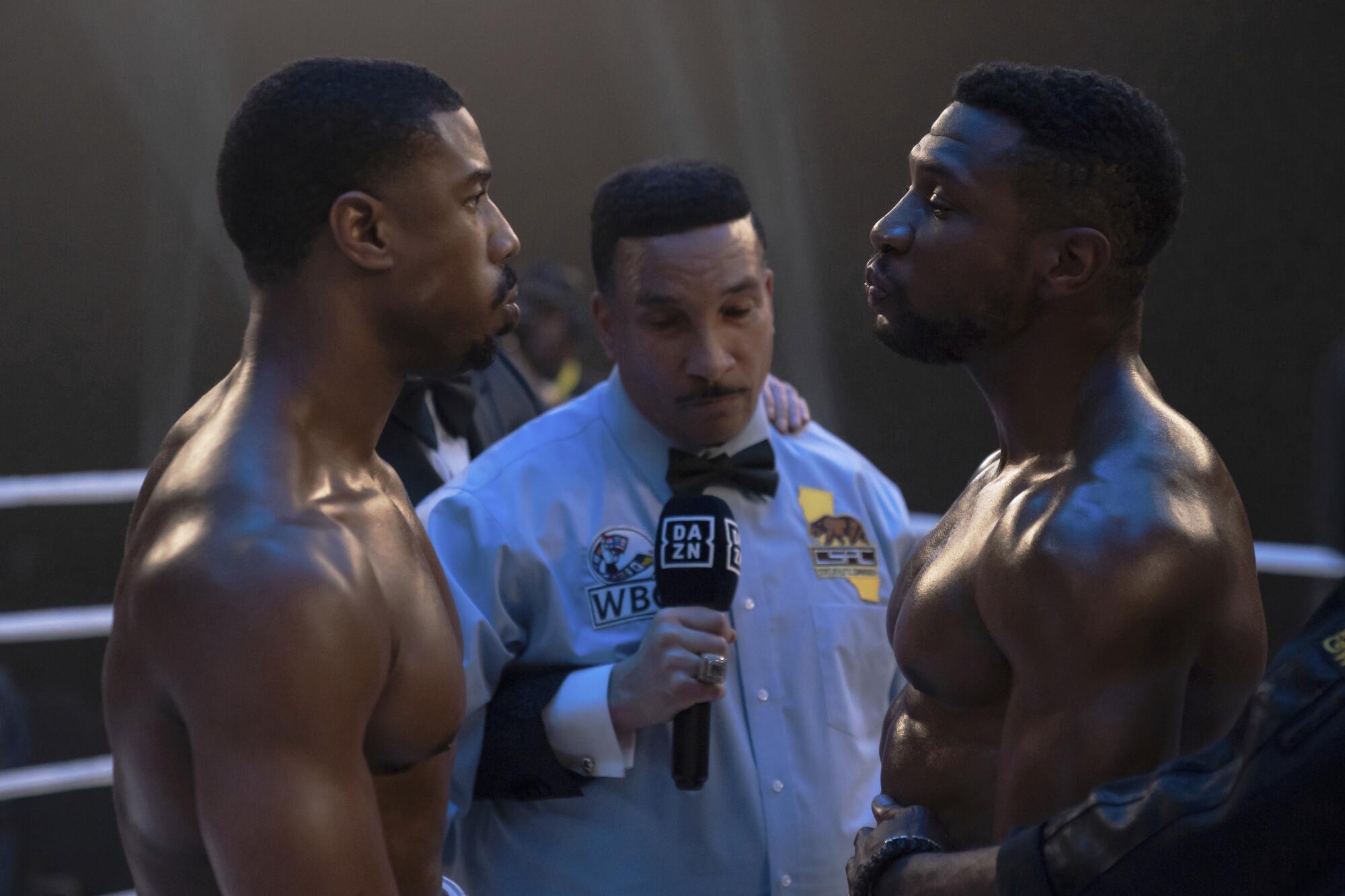
Stallone, who co-wrote “Creed II” and is listed as a producer on “Creed III,” has been a vocal critic of “Rocky” producer Irwin Winkler, demanding “what’s left of my rights back” in a series of social media posts last summer. In a subsequent interview with the Hollywood Reporter, Stallone called his absence from the film “a regretful situation”: “It was taken in a direction that is quite different than I would’ve taken it. It’s a different philosophy — Irwin Winkler’s and Michael B. Jordan’s. I wish them well, but I’m much more of a sentimentalist. I like my heroes getting beat up, but I just don’t want them going into that dark space. I just feel people have enough darkness.”
Asked about Stallone’s gripes, Jordan was diplomatic.
“There’s a lot of things in this business that have nothing to do with you,” he said. “This franchise was started before I was even born. Let’s just start right there. Then there’s the DNA of the world Sly has built. The underdog spirit which has always been there.”
He paused: “We’re in a different age. I’ve got a following that love Creed for who he is. Some of these people don’t even know who Rocky is. They’ve never seen the ‘Rocky’ movies. But they’ve seen ‘Creed.’
“My job is to focus on the work, the story, the character, all these things that are in play, and not take any of this other stuff personally. There’s nothing but love and opportunity. If and when Stallone wants to be a part of this, publicly or privately, I’ll always be here with open arms and a warm smile, like it’s always been.”
More top of mind for Jordan than Stallone is his “Creed III” co-star Majors. The actor, who had already been hailed for his work in “The Last Black Man in San Francisco,” “The Harder They Fall” and HBO’s “Lovecraft Country,” has emerged as one of Hollywood’s most sought-after stars, racking up acclaim for his performances in the recent period piece “Devotion,” Marvel’s “Ant-Man and the Wasp: Quantumania” and the Sundance competition title “Magazine Dreams.”
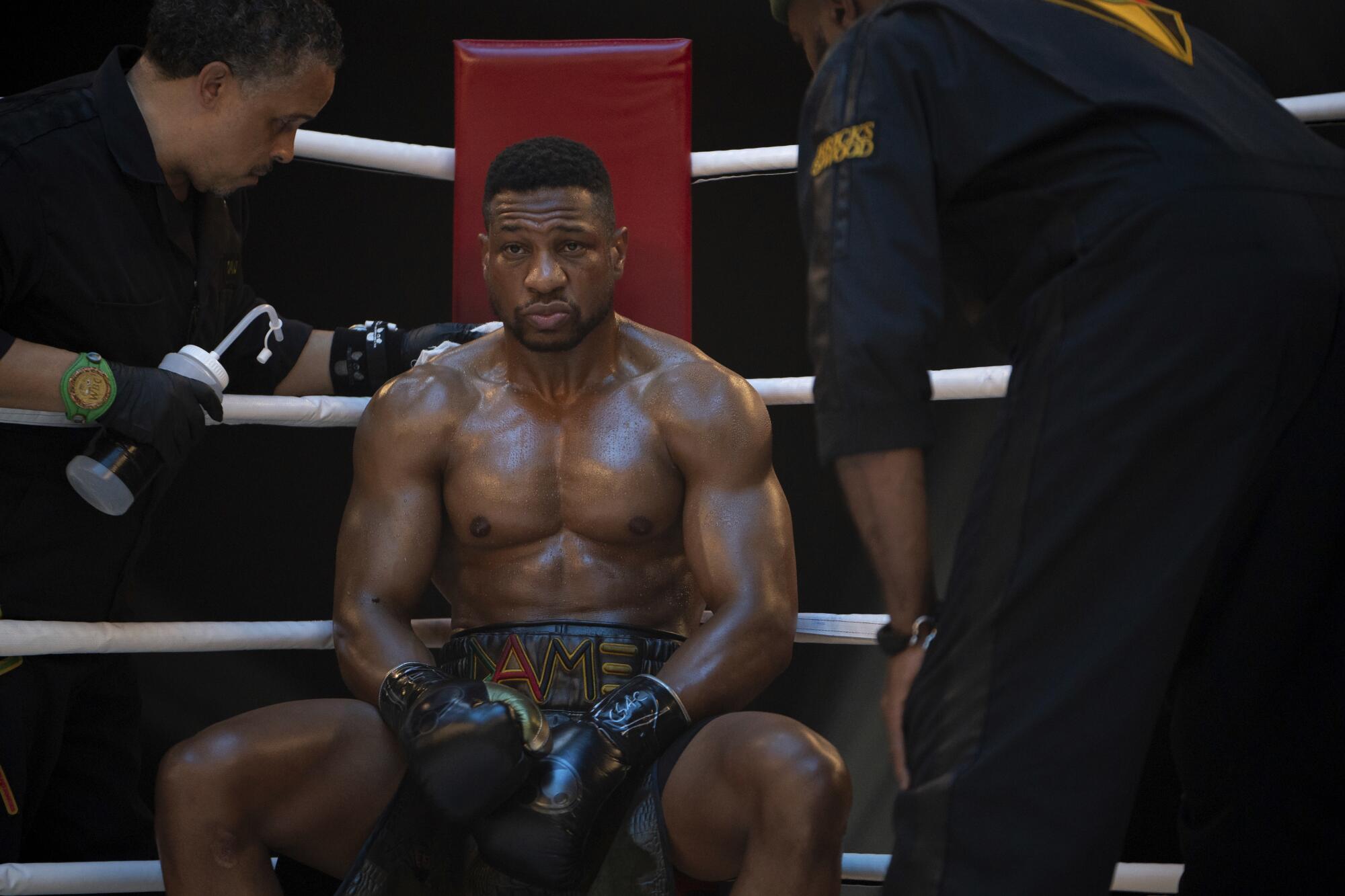
The mere mention of Majors energized Jordan: “I’m so proud of him. He’s a brother of mine. I know what he’s going through. I’ve had a three-picture year, and I know what that can do to you. I’m happy to navigate, to help him where he wants to go. But he’s doing fine without me.”
He grew quieter as he noted similarities between Majors’ experience and his own breakthrough in “Fruitvale Station,” when he and Coogler realized they made a powerful team and wanted to continue working together.
“A part of me feels like I have a second chance to do that with Jonathan, because I didn’t have an opportunity to do that with Chad —” His voice trailed off at the thought of his “Black Panther” co-star Chadwick Boseman, who died of colon cancer in 2020. The death of Boseman, who had swiftly become one of Hollywood’s most beloved actors, was a devastating blow to fans and those who worked with him on “Black Panther,” “Ma Rainey’s Black Bottom,” “Da 5 Bloods” and other projects.
Jordan remained silent for several seconds as he looked into the distance. “I wanted to do more with him, you know. And I’m not letting this time go by ... I’m excited about opportunities to work with Jonathan again.”
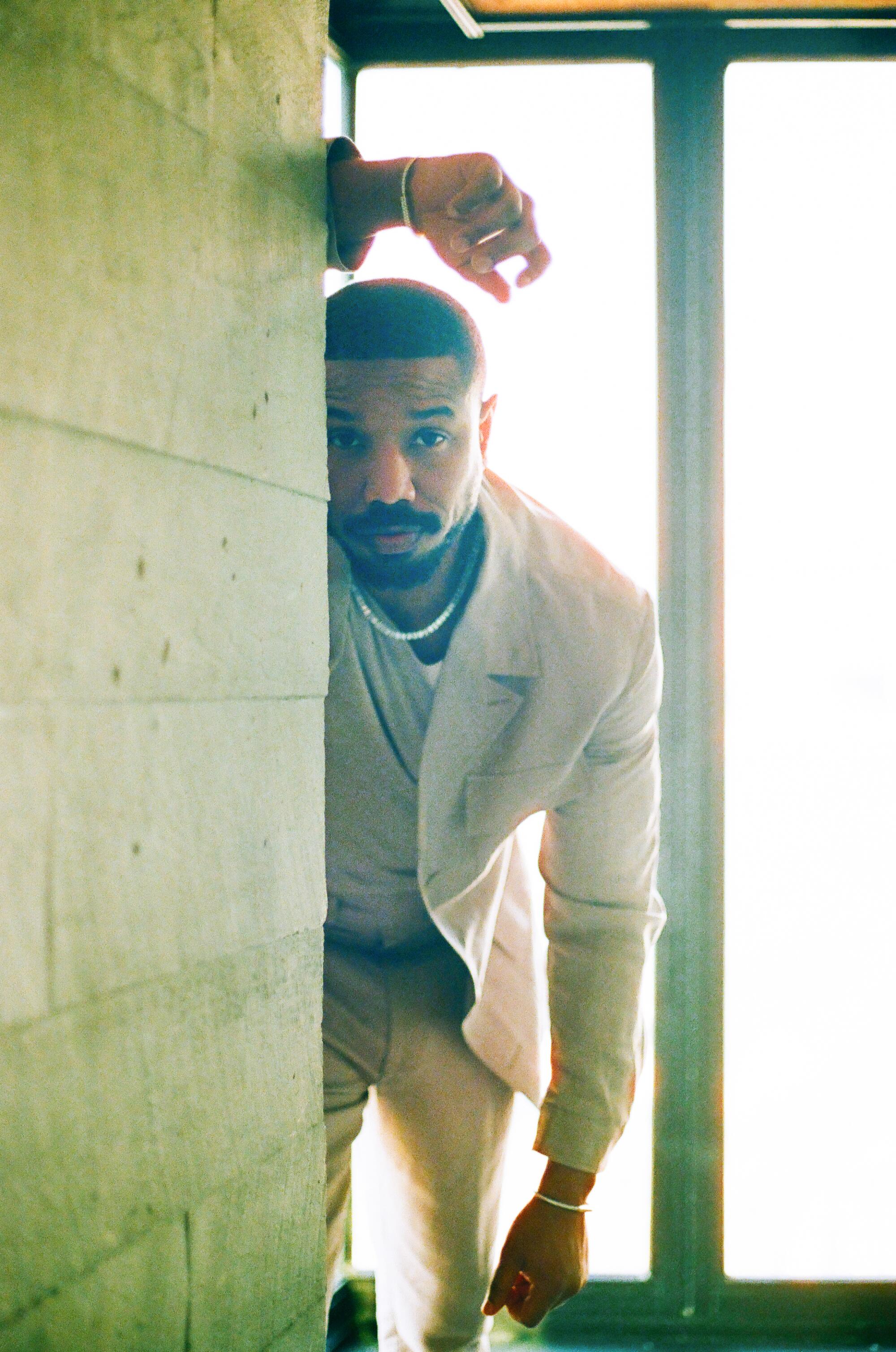
Majors, in a separate interview, called Jordan “one of the last movie stars. He’s a survivalist. I have such great admiration for him. We’re best friends. And he knows the ‘Creed’ world better than anyone else in the world.”
Thompson was also impressed by Jordan’s handing of his directing duties: “To be honest, it didn’t feel all that different from before. He still felt very much like my co-star.”
She was also invigorated by Adonis and Bianca’s relationship evolving to include parenthood.
“The two of us would be the first to acknowledge that we’ve both had ups and downs in our personal relationships, trying to navigate what real love looks like,” Thompson said. “There’s something nice about returning over the course of nine years to a couple you can really bet on.”
‘Black Panther’ and ‘Creed’ star Michael B. Jordan hosted this week’s episode of ‘Saturday Night Live’ with musical guest Lil Baby.
Speaking of romantic ups and downs, Jordan experienced a highly publicized breakup last year with model/influencer Lori Harvey, the daughter of comedian Steve Harvey. He joked about the split when he hosted “Saturday Night Live” in January. A few weeks later, Harvey was photographed with her new boyfriend, “Snowfall” star Damson Idris.
Asked how he was coping with his personal life while also celebrating his “Creed III” milestone, a publicist suddenly appeared in the room, ordering that the focus of the interview remain on the film.
A few moments later, Jordan said tersely, “That’s been addressed.”
The mood lightened when Jordan moved on to discussing his plans after “Creed III.”
“I need to recalibrate,” he said. “I’ve poured everything I’ve had creatively into this. I kind of feel like I need to fill that bucket up again, travel a little, see some things, interact with some people. Live a little, so I can have more things to say.”
More to Read
Only good movies
Get the Indie Focus newsletter, Mark Olsen's weekly guide to the world of cinema.
You may occasionally receive promotional content from the Los Angeles Times.
